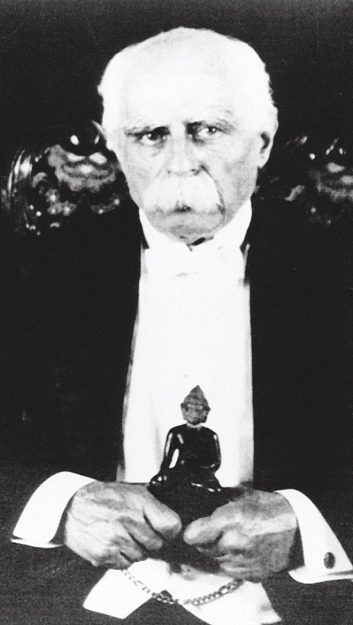In 1903, Colonel Younghusband, the aristocrat, described by one biographer as the last great imperial adventurer, drove 3,000 troops and twice as many retainers across the Himalayas in a needless exercise to project British imperial influence beyond India’s northern perimeter. To obtain the support of his government, he had fomented a fear that Russian weapons were being imported into Tibet, presaging an attack on British India. There were, however, no Russians in Tibet, and only three Russian rifles and a few cartridges subsequently came to light; as in later wars of similar construction, the absence of weaponry required another casus belli. In this case the British were enforcing their perceived right to enter into correspondence with Lhasa over their claim to monopolize access to trans-Himalayan trade.

Since Younghusband had been instructed by London to take his troops only as far as was necessary to get the Tibetans to negotiate, he rejected each delegation sent to discuss terms with him on the grounds of their lack of seniority. This allowed him to push all the way to Lhasa, a project in which he deployed Maxim guns against Tibetans armed with flintlocks, many of whom he famously gunned down as they walked away in retreat, or, in one case, after they had been persuaded or cajoled to give up their defensive positions under the pretext of negotiating. His motivation is said by some to have been a simple fascination with the fabled city of golden rooftops and a desire to acquire fame as the first Westerner in modem times openly to enter it. He thus became the first man since the Dzungar Mongols in 1717 to have successfully invaded Tibet and taken its capital by force.
But this was not how Younghusband saw his role. In September 1904, six months after overseeing what he described privately to his father as “a pure massacre” of Tibetan troops at Chumik Shenko (he blamed it entirely on the Tibetans) and four weeks after forcing the Tibetans to sign the surrender agreement in Lhasa, Younghusband returned with his troops to India, having lost only 34 of them in battle. The mind with which he left was the opposite of that with which he had arrived, at least in terms of what he chose to recollect: the military adventurer reconstructed himself as a spiritual pioneer. He wrote later of his experience at the moment of his departure, as he looked down from a high mountain pass:
I went off alone to the mountainside and gave myself up to all the emotions of this eventful time.. . . Bathed in the insinuating influences of the dreamy autumn evening, I was insensibly suffused with an almost intoxicating sense of elation and good-will. This exhilaration of the moment grew and grew till it thrilled through me with overpowering intensity. Never again could I think evil or again be at enmity with any man. All nature and all humanity were bathed in a rosy glowing radiancy; and life for the future seemed not but buoyancy and light. . . . That single hour on leaving Lhasa was worth all the rest of a lifetime.
His rebirth is not to be explained by guilt, of which there is no trace in his writings, or by doubt about the morality of his political excursions. Maybe the spiritual simply offered a new and, to his mind, uncharted territory to conquer; more likely, all great empires and their protagonists veer at moments of triumph between attraction to the truly vicious and to the apparently sublime. It was an experience that profoundly changed his life. Whatever apparent shift in what is aptly called orientation in his perceptions of the East, the history of many foreign travelers in Tibet, not excluding some Chinese, is in part a story of foreigners becoming engrossed and repelled them.
♦
From Lhasa: Streets with Memories, (c) 2006 by Robert Barnett. Published by arrangement with Columbia University Press.